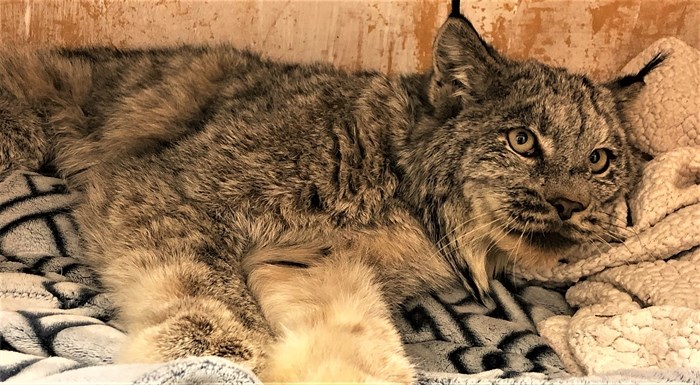
This female lynx is currently at the B.C. Wildlife Park in Kamloops being fed until she is fit enough to be returned to the wild.
Image Credit: FACEBOOK/B.C. Wildlife Park
January 19, 2021 - 7:30 AM
The lack of snow may be behind the recent sightings and rescues of lynx in Kamloops.
A female lynx caught on the North Shore in Kamloops last week is currently recovering at the B.C. Wildlife Park and since the cat has been in care, there have been reports of a third lynx on the North Shore. Back in November, a sick lynx was spotted wandering in the city and nursed back to health at the wildlife park.
It is unusual for lynx to be found in the city, but the reasons are still unclear.
While it's too soon to say food scarcity is an issue for these wildcats, conservation officer Graydon Bruce says it could be that snowpack isn't aiding the lynx in hunting for prey, or it could simply be "odd behaviour."
Whatever the reason, Bruce wants to emphasize the importance of reporting sightings or conflicts with wildlife.
"Because many of the reports are on Facebook, we're hearing about them three or four days later," Bruce says. "The public shouldn't be afraid we will euthanize them. We always keep the animal's best interests at heart."
Tracy Reynolds, manager of care at the wildlife park, said the lynx in their care is healthy but needs to eat.
A decision on where to release the wildcat will be made by the conservation officer service with advice from provincial biologists. They will pick a place with the best habitat where food is available.
Bruce says with all predator species there's a risk that they can habituate back to areas where they've been a problem and have had success with finding food.
However, lynx are a small risk to public safety so there's no need to relocate them hundreds of kilometres away like they would with a grizzly bear, which is a more at-risk species and poses a greater threat to humans.
To report a wildlife incident call the B.C. Conservation Officer Service at 1-877-952-7277.
To contact a reporter for this story, email Levi Landry or call 250-819-3723 or email the editor. You can also submit photos, videos or news tips to the newsroom and be entered to win a monthly prize draw.
We welcome your comments and opinions on our stories but play nice. We won't censor or delete comments unless they contain off-topic statements or links, unnecessary vulgarity, false facts, spam or obviously fake profiles. If you have any concerns about what you see in comments, email the editor in the link above.
News from © iNFOnews, 2021